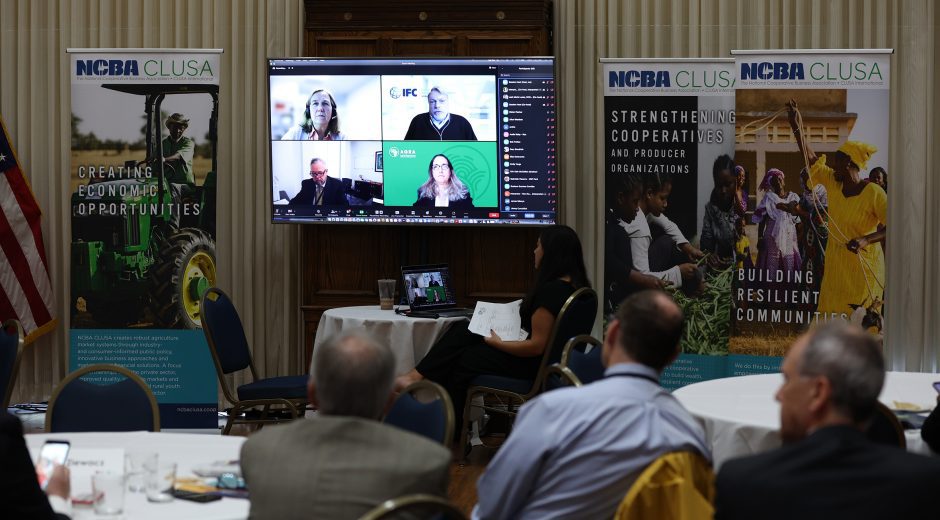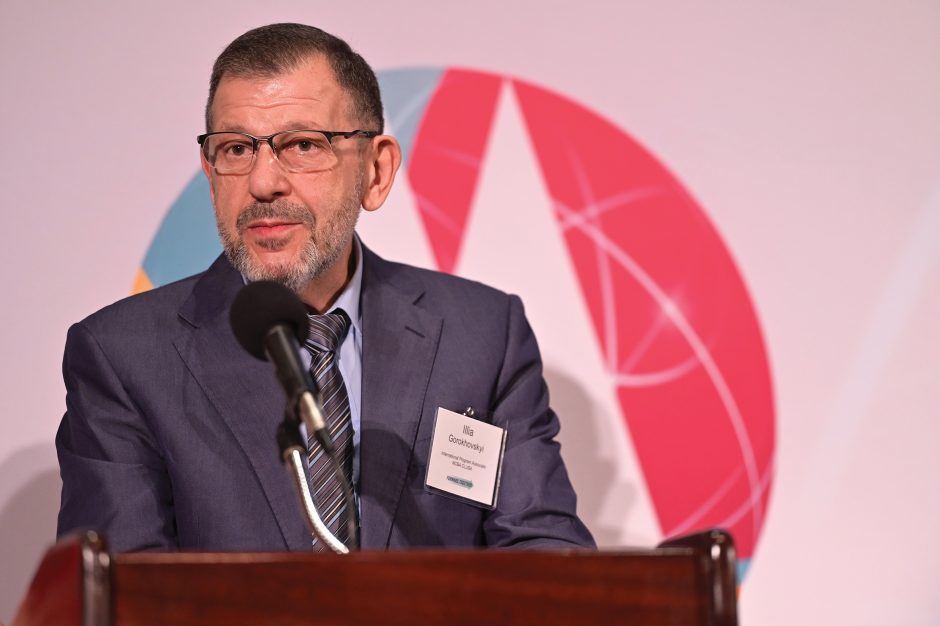This year’s NCBA CLUSA Coop Impact Conference featured sessions on the role of co-operatives in international development, as part of a dedicated international programming organised in partnership with the US Overseas Cooperative Development Council (OCDC).
“We seek partners with voluntary, open membership, that are democratic and member controlled, represent the economic interests of their members, are autonomous, educate their members and work through local, national and international structures for sustainable community development,” said Donald Steinberg, expert advisor on localization, Office of the Administrator, US Agency for International Development (Usaid). He added that characteristics of a model Usaid partner mirror the seven co-operative principles.
According to Steinberg, locally led development requires: channelling a larger portion of development and humanitarian awards directly to local civil society, businesses and other institutions that are supported by and accountable to local communities; securing a seat at the head of the table for local actors under the principle ‘Nothing about us without us’; taking into account each country’s unique political, cultural, economic and environmental conditions; and drawing new strengths from the global embrace of the diversity, equity inclusion and accessibility movement.
Judith Hermanson, director, International Cooperative Research Group, OCDC, also said that when localisation is the goal, co-operatives are some of the best partners for Usaid.
OCDC’s white paper, From the Ground Up: Partnering with Cooperatives on Locally Led Development, found that co-ops empower local people and institutions to own the planning, implementation, and evaluation of their own sustainable development. Hermanson added that the strength of co-ops comes from the seven co-operative principles and how these operate together to benefit their members and communities.
Another OCDC report titled What difference do cooperatives make? found that co-operative members in Kenya, Peru, the Philippines and Peru are more likely to have higher than average incomes and are less likely to be very deprived.

Yet, Hermanson warned that it was important for co-operatives to have supportive legal frameworks and receive training to use donor funding in a responsible way.
In another session, Leah Marie Lucas, research manager at OCDC, said that co-ops were “ready to innovate and be a part of the solution” and needed “a hand up” rather than “a hand out”. “They can serve as an ally for national, regional and global development,” she said.
“We looked at coffee across East Africa, five countries, 30 co-operatives, 68,000 members and we found that over 96% of respondents were implementing some form of climate smart agriculture,” she said.
Dr Mukulira Olivier, managing director of the Rwanda Institute of Cooperatives, Entrepreneurship and Microfinance, referred to his country’s experience, where co-ops operate in all economic sectors, from transport to agriculture or tourism. Co-ops have five million members in Rwanda, a country with a population of 11 million. “Co-ops sit in the driver’s seat in terms of economic development for the country,” he said.
Related: NCBA CLUSA launches co-op development scheme for underserved US farmers
One of the co-operatives partnering with Usaid is Frontier, a supplier of organic herbs and spices, which has been running a sustainable sourcing programme called Well Earth since 2009. As part of the programme, Frontier worked with Fedecovera, a Guatemalan co-operative group of 36 smaller co-operatives that support 60,000 people. Ravin Donald, Frontier’s senior vice president of technical services, explained how the programme had helped Fedecovera expand its organic spice production, set up a dental health clinic and adopt pasteurisation, grinding, and develop sterile handling processes in the local processing plant.
Co-operatives can also play an important part in boosting economic development in Peru, according to Julio Arias Executive, director of the National Confederation of Cooperatives of Peru (Confenacoop). His organisation identified several sectors where co-ops can provide solutions, including housing, transport, and recycling. Co-ops can help to formalise the informal economy by, for example, bringing waste pickers together to achieve scale.
Another area where co-ops add value is traceability. According to Dieter Fischer, lead for Agribusiness Advisory Services in Latin America and the Caribbean, International Finance Corporation, co-ops offer a way to aggregate farmers together to enable them to collect data.
Despite their positive contributions, co-operatives face various challenges. Steinberg pointed out that these issues were often not related to the project itself but caused by issues such as a closed civil society, a distrust in the model by some governments, corruption, or using inappropriate language. Regulations and the requirements for accountability can also act as an impediment by demanding too much too quickly, he added.
“In order to be a good partner we need you to hold us accountable. We need you to tell us about the barriers that you’re facing and what we can do to improve that situation,” he said.
Related: US co-ops apex NCBA CLUSA makes a push for Principle 6
Other hurdles are generating increased good governance and ensuring transparency – when this does happen farmers are able to increase profitability, said Vanessa Adams, vice president of strategic partnerships and chief of Party, Alliance for a Green Revolution in Africa (AGRA).
Adams thinks another challenge for co-ops is the lack of access to expanded open markets. Agra works with governments to enable co-ops to do better forecasting of crops.
Some co-operatives also struggle to secure fertilisers, an issue Usaid is trying to address through its Feed the Future programme. The agency also collaborates with NCBA CLUSA, through a Farmer to Farmer programme that sends US farmers and business professionals on agricultural development assignments in Ecuador, Peru and Honduras.
Going forward, Usaid intends to place a greater emphasis on gender inclusion and engagement of traditionally marginalised people, according to Michael Michener, deputy assistant administrator, at its Bureau for Resilience and Food Security.
Coop Ukraine chair delivers keynote speech
One of the keynote speakers addressing the Impact Conference was llia Gorokhovskyi, the chair of Coop Ukraine, who thanked US co-ops for their support.
Despite the impact of the war, Ukrainian co-ops have continued to provide essential goods and services to their members and customers while welcoming displaced persons, collecting funds for the Ukrainian army and training young people via co-operative colleges.

He paid tribute to co-operators who lost their lives in the conflict and called on co-ops in the UK to continue to support those of Ukraine.
“As I mentioned at the ICA General Assembly in Seville, I am a proud and honourable person – it is hard for me to ask for something but today my country and co-ops of Ukraine need help and I ask all of you if you have such an opportunity, to help and support [us] . We are very thankful for all your help and support, and we hope for future friendship,” he said.
Related: Ukrainian credit union numbers fall as Russian shelling worsens
In a session on how co-ops respond in times of crisis, Gorokhovskyi said that Ukraine’s co-operatives had lost an estimated US$80-100m due to the war, and that the rebuilding effort will require a ”very comprehensive programme” carried out by a national network of co-ops.
Gorokhovskyi also asserted that future support from the co-op movement should be “targeted assistance”, which goes directly to Ukrainian co-ops, rather than through charities such as the Red Cross.
In the same session, Ewa Sierzynska, chief of party for Woccu’s Usaid-funded Credit for Agriculture Producers (CAP) project in Ukraine, which has been operating in the country since 2016, spoke about the vital role of credit unions, particularly since the Russian invasion. Sierzynska said credit unions support rural communities in Ukraine via both consumer lending and businesses: “The role that they played for the past 30 years is now even more important, as we face food security issues and operate in war times”.
Sierzynska added that the Covid-19 crisis had helped credit unions be in a better position to support farmers in Ukraine now, as there was a push to move services online, which is proving to be useful as infrastructure is being disrupted due to the war.
Karen Zimbelman, senior director of membership and cooperative relations at National Co+op Grocers in the US, said that it is in co-ops’ “DNA” to “step up and reach a hand out” in times of crisis. Zimbelman spoke about the number of crises in the US where co-ops have supported local communities affected by wildfires and floods, and highlighted the power of storytelling to connect co-op members with their counterparts in different areas of the world.
Neighboring Food Co-op Association’s executive director Erbin Crowell detailed his experience as an anthropology student who encountered the word co-operative in range of different settings across the world, including indigenous communities in Mexico that were using the model to defend their languages and cultures, Campesino movements that saw the co-operative identity as indivisible from gender equity, and co-ops in Africa that use the co-op model to negotiate the global economy.
Carrie Hessler-Radelet, president and CEO of development organisation Global Communities, also shared her experience of how co-ops can provide routes to social inclusion, saying: “Talent, intellect, motivation and potential are equally distributed. But opportunity is not. A co-operative provides opportunities for people to be able to thrive in an environment where they can work with others to support each other.”
The positive impact co-ops can have on women was also discussed, but it was agreed that more work needs to be done to achieve gender equity across the world’s co-ops. Global Communities have created a ‘Gender Equity and Good Governance in Cooperatives’ guide, which is designed to help co-ops with their gender inclusion strategies through training.
Bob Fries, chief technical officer at international development organisation ACDI/VOCA, noted a “dramatic shift” since he began his work in the sector in 1989, in how US development programmes view and measure inclusion, from focusing on households’ access to economic opportunities such as co-ops, to a deeper look at how individuals in those households are benefiting from that access within a wider context. “As we move from a more focused co-operative development approach, to looking at value chains more broadly, and what are the systems that are working there, it has changed what we see,” said Fries.
Senior vice president of the National Rural Electric Cooperative Association (NRECA), Dan Waddle, shared that from his time working on electrification projects in Latin America and Africa, governance is a “huge issue”, and said “there has to be a firewall between local political leadership and a co-op. You have to make a choice – you can either be a politician or you can be a board member, but you can’t be both.”
Some of the other challenges associated with co-op development and social inclusion were also discussed by the panel, such as access to capital, knowledge gaps and language barriers.
To overcome these barriers, Crowell said, co-ops “need to be intentional about incorporating our shared values into the way we do business as well as the influence we have in communities around us”. He added that while achieving more inclusive societies is not something the co-op movement can accomplish on its own, it can “demonstrate what that society can look like if we’re intentional about it in our own co-operatives”.